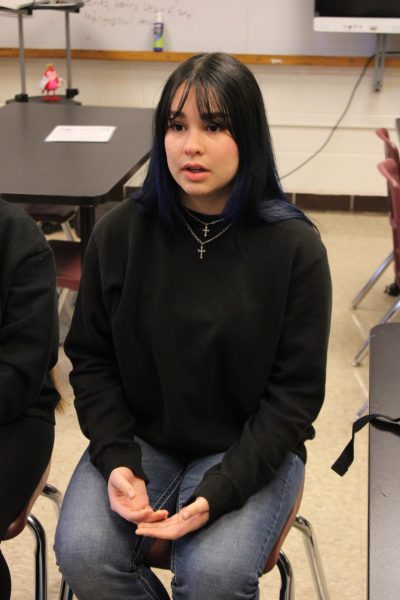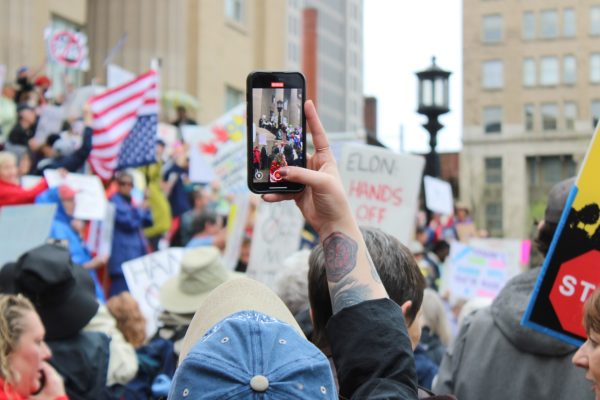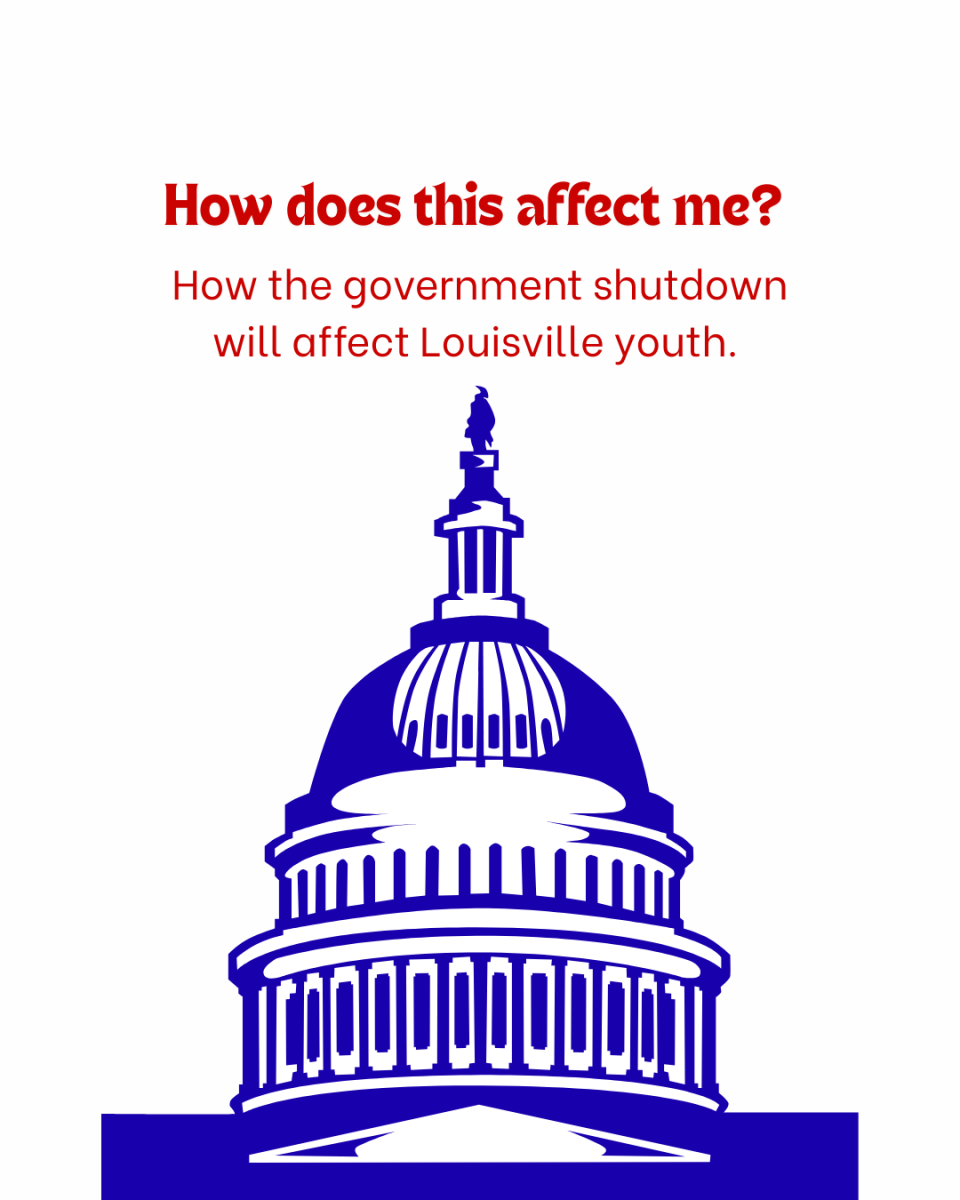It was the senior year she’d been waiting for. As Vianka Ricardo Ojeda, 18, was reaching the end of her time at Seneca High School, she was already planning for the future.
Ricardo Ojeda’s family immigrated from Cuba to the U.S. in search of a better future away from an oppressive regime. Now, she was finally getting her chance. She’d picked a college and a roommate. She couldn’t wait to learn how to change the tire on her first car. She was ready for the next chapter.
Then President Donald Trump won the 2024 election.
Suddenly, the excitement turned to anxiety. Looking forward to the future turned to compulsively checking windows in case an immigration officer was waiting outside, and the friend she had chosen as her college roommate decided to repatriate, or self-deport, back to Mexico. Each day as Ricardo Ojeda went to school, she could only hope that her life at home would remain intact. Concentrating in her classes became much more difficult.
“You can’t really focus everything you have into studying because you don’t know if you have a future,” Ricardo Ojeda said.
Since Trump won the election in November, running on a platform promising mass deportations, immigrant families and students around the country have faced immense anxiety.
Jenni Garmon sees these impacts firsthand. As the mental health practitioner at Newcomer Academy, a JCPS school for beginning English speakers in grades 6-12, she has noticed a significant impact on the students.
“There’s a dramatic increase in worry and fear about safety,” Garmon said, “even for students who don’t necessarily have anything to worry about legally, because they understand that it isn’t about legality, it’s about perception.”
Trump’s slew of executive orders since his inauguration has kept immigration law and news ever-evolving, fueling further confusion and uncertainty for immigrant communities.
Dissecting the Headlines
According to the Trump 2024 campaign’s official website, his number one platform was to “seal the border and stop the migrant invasion.” He also promised to “demolish the foreign drug cartels, crush gang violence, and lock up violent offenders.”
However, Trump’s plan for mass deportations is not as feasible as he promises.
While many of his campaign speeches focused on this “migrant crime epidemic,” the American Immigration Council reported in October 2024 that from 1980 to 2022, as the immigrant population grew, the national crime rate decreased. Additionally, in most U.S. cities, crime has declined since 2022, according to the Brennan Center for Justice.
Sarah Stricklin is a student in her third and final year at the University of Louisville’s Louis D. Brandeis School of Law. She’s currently participating in an immigration clinic. Stricklin explained that the legal process is not able to support deportations on the scale that Trump has planned.
For a deportation to take place, immigrants must be found deportable due to a loss of permanent resident status or a violation of criminal or immigration law. In nearly all cases, undocumented immigrants also have the constitutional right to due process, allowing them to appeal deportation decisions in court.
“There’s just no feasible way to speed that up without depriving people of due process, which is exactly what he’s doing,” Stricklin said.
She believes that Trump’s plans are also impractical due to a lack of resources.
“There’s no beds for him to put them in,” Stricklin said. “There’s already been humanitarian issues and overcrowding in lots of the detention centers.”
In February, Immigration and Customs Enforcement (ICE) released 160 migrant detainees as some detention facilities reached 109% capacity.
Despite overcrowding, Trump has taken several actions to make more immigrants vulnerable to deportation.
On the first day of his presidency, he signed 10 executive orders seeking to change immigration policies, including the suspension of the Refugee Admissions Program, which would discontinue refugee entry into the U.S. indefinitely. However, a federal judge in Seattle blocked this order on Feb. 25.
Kentucky Refugee Ministries, a nonprofit resettlement organization, reported in February that this decision caused over 100 travel cancellations for refugees in their organization alone.
On Jan. 28, the U.S. Citizenship and Immigration Services announced that it will pause American-sponsored humanitarian aid programs. This means that individuals seeking temporary entry into the U.S. from war-torn countries like Ukraine and Afghanistan will be denied during the suspension.
Trump has also worked to revoke Temporary Protected Status (TPS), a designation given to countries where the Secretary of Homeland Security determines that conditions in the country would prevent its nationals from returning home safely. Currently applying to countries such as Afghanistan, Haiti and Venezuela, TPS protects migrants from deportation and makes them eligible for employment authorization.
However, this stands to change. The Department of Homeland Security announced on Feb. 5 that TPS will expire for Haitians on Aug. 3 and for Venezuelans on April 5 for those under the 2023 designation, meaning that any Venezuelan nationals registered for TPS under the 2023 designation will no longer qualify and will be eligible for deportation. The 2021 TPS designation for Venezuela will remain in effect until Sept. 10.
Yet, crises continue in both countries. Armed gang violence and widespread poverty have inundated Haiti, and Venezuela continues to experience a humanitarian emergency and government-led prosecution of any dissenters.
Additionally, on the first day of his presidency, Trump issued an executive order that would remove automatic citizenship from children born in the U.S. to undocumented parents. This was a step toward ending birthright citizenship, which is outlined in the 14th Amendment. It guarantees that anyone born in the U.S. is automatically a citizen, regardless of their parents’ immigration status.
In response to Trump’s action, attorneys general from 22 states sued in federal court, arguing that the order violated the amendment.
“That would hurt many, many people. Not even just immigrants, but many U.S. citizens would be hurt by that,” Stricklin said. “I can’t even begin to describe how that would impact Louisville.”
Within days of his presidency, the Trump administration officially rescinded decade-old guidance that prevented ICE and Customs and Border Protection (CBP) from carrying out immigration arrests in sensitive locations like churches, schools and hospitals.
“This action empowers the brave men and women in CBP and ICE to enforce our immigration laws and catch criminal aliens — including murderers and rapists — who have illegally come into our country. Criminals will no longer be able to hide in America’s schools and churches to avoid arrest,” the U.S. Department of Homeland Security said in a statement following the decision.
The National Education Association (NEA) criticized the new administration’s guidance.
“If implemented as promised, Trump’s policies will lead to fear and upheaval, mass panic in immigrant communities, and will predictably harm school environments including by causing increased absences, decreased student achievement, and parental disengagement,” the NEA said in a statement.
Additionally, five states have proposed legislation that would challenge public education for undocumented students, a possible violation of Plyler v. Doe. This landmark 1982 Supreme Court case ruled that denying undocumented children of immigrants the right to attend public schools constitutes discrimination and violates the Equal Protection Clause of the 14th Amendment.
In January, Oklahoma began requiring schools to ask for proof of a student’s immigration or citizenship status. While this does not prevent undocumented students from attending school, it requires school districts to track and report any without proof of legal status.

According to NPR, schools around the country have reported attendance drops and mental health crises among students who fear that their classrooms are no longer safe.
“Trump is coming after immigrants, and he says he’s coming after undocumented immigrants and criminal immigrants because he’s banking on the fact that people aren’t going to pay attention or they aren’t going to care if it’s immigrants, and especially if it’s criminals,” Stricklin said. “But there’s already evidence that he’s sweeping up innocent people.”
The Trump administration confirmed in April that it mistakenly deported a Maryland man to a prison in El Salvador due to an “administrative error.” The administration still accuses the man of gang membership, but he was never charged with a crime.
Immigration authorities are also currently facing criticism for their arrest of Mahmoud Khalil, a Columbia University student and legal permanent resident. The federal government claims that Khalil’s “presence in the country enabled antisemitism,” following his participation in pro-Palestinian campus protests.
“I’m with constant fear”
Although there is no evidence that ICE has arrested any students in K-12 schools, it doesn’t stop the fear and anxiety for immigrant and refugee students.
These anxieties have had an immense impact on Louisville’s schools, which have experienced a rapid growth of multilingual students in recent years. JCPS reported over 20,000 multilingual learners in 2024, a dramatic increase from 9,451 in 2018, meaning that around one in five JCPS students is a non-native English speaker.
In 2017, the JCPS board passed a resolution designating the district as a “safe haven” for immigrant students. The resolution notes that, regardless of immigration status, every child has the right to attend public school. It requires ICE officers to have written authorization and the superintendent to give adequate notice to students and staff before officers enter the schools. Additionally, it prohibits JCPS employees from asking about a student’s documentation status or sharing it with ICE officers without a court order.
In January, JCPS sent the district’s principals instructions for “non-emergency visits from government officials,” a reminder of current district guidance. It advised staff to call district police and ask for an officer to be present in the case of a visit.
Despite these protections, immigrant students in Louisville still fear for their safety.
Milenia Waltrip, the executive director of the nonprofit Latinos Unidos en el Camino a la Éxcelencia, or Latinos United on the Path to Excellence (LUCÉ), has noticed a significant impact on Louisville’s Hispanic community.
“We have seen an increase in fear, anxiety — especially among students and young children,” Waltrip said.
Garmon has also witnessed this uptick in mental health issues with her students at Newcomer.
“I’ve had to have multiple conversations with students and parents of students regarding their concern about safety,” Garmon said. “I’ve had to talk to students about their fear about what might happen as they walk to bus stops.”
Garmon predicts that any anxiety or stress resulting from this situation could significantly impact students’ ability to learn.
“It’s impossible to try to learn English if your brain is focused on survival,” Garmon said.
Though she recognizes their strength and resilience, she doesn’t believe in pretending that circumstances are normal for immigrant students.
“It is definitely going to affect a lot of factors of their lives, not the least of which is learning English and math and science and social studies,” Garmon said.
Heysha Diaz Melendez is an English teacher and sponsor of Seneca’s Hispanic Students United (HSU). HSU is a program at several JCPS schools that focuses on sharing Hispanic culture with all students through food, dances and events, like their district-wide end-of-year gala. She echoed Garmon’s concern about changes in students’ mental health since Trump’s inauguration.
Diaz Melendez’s students, many of them seniors, have expressed their worries about their well-being once they leave the relative safety of high school and embark on their futures. She’s even had students openly weep in front of her.
“I’ve read what they’ve written about their experiences getting to this country, and it’s heartbreaking,” Diaz Melendez said. “All that the kids had to get through just to be sitting here, and then you add on top of that the challenges of being a student.”
She implores JCPS to be more aware of the effect that the Trump administration is having on immigrant students.
“This is what’s dominating their train of thought, their concern, their mental health,” Diaz Melendez said. “We need to take that into consideration.”
Ricardo Ojeda, Grecia Mavares Osorio, 18, and Daniela Garcia, 18, are three immigrant students and members of Seneca’s HSU leadership team.

Mavares Osorio, the community engagement manager of Seneca’s HSU, escaped from Venezuela around 3 1/2 ago. Though it was her home, its oppressive government and widespread poverty threatened the lives of both her and her family.
“Me and my dad, we can get killed if we go back,” Mavares Osorio said.
This reality has placed incredible stress on her family. They came to the U.S. for a better future — a future which may now be erased.
“My mom has two jobs and she has cried in front of me, telling me that she doesn’t feel sure going to work or sending me or my brother to school,” Mavares Osorio said.
Garcia, the president of Seneca’s HSU, and Ricardo Ojeda, the press secretary, both fled Cuba’s one-party communist state, which suppresses opposition and restricts civil rights. As a young girl, Ricardo Ojeda had to watch as her mother was violently dragged through the streets of Cuba because she protested against the government. Returning is unimaginable for either of them.
Now, all three students have to go to school and hope that when they return home, their worst fear won’t come true.
“I’m with constant fear that I go home one day, my mom’s not there,” Garcia said.
But along with the stress from the new administration’s immigration policies, teenage immigrants still have to attempt to be regular high school students. Facing the daily realities of homework and exams becomes even more difficult when students’ top priority is the safety of themselves and their families.
“It doesn’t allow you to concentrate and focus in class because you’re thinking about that all the time,” Garcia said. “You’re like, ‘what if they come to the school today?’”
This leaves students feeling as if nowhere is safe anymore.
“It’s so terrifying that you want to just go to school and do your work and so you can go back home and be safe again,” Mavares Osorio said. “But the thing is that, right now, you’re not even safe in your home.”
Throughout Trump’s presidential campaign, he often used rhetoric that many immigrants found offensive. He alleged that Haitians were eating cats and dogs, and frequently stated that illegal immigrants were stealing American jobs.
“I’m not here to steal jobs or make people uncomfortable because of my pride of being Hispanic. I’m not here for that. I actually have a dream. I want to go to college and I want to have a job,” Mavares Osorio said. “I don’t have any of these chances on my country. That’s why I’m here.”

ICE’s official X account publishes names and photos of arrested illegal immigrants around the country, along with the crime they are charged with. The posts describe the individuals as “criminal aliens,” rather than people.
According to an internal memorandum obtained by Axios in January, ICE officially directed its employees to use the term “alien,” rather than “immigrant.” This reversed Former President Joe Biden 2021 decision to use the word “noncitizen.” Many immigrant rights organizations and members of Louisville’s Hispanic community consider this choice dehumanizing.
“I’m a cheerleader. I’m here at school. I want to go to college. I want to be a veterinary technician. I have a business with my mom,” Mavares Osorio said. “But am I actually an alien?”
Despite narratives that may be promoted through the media and politicians, the vast majority of immigrants and refugees aren’t coming to the U.S. to bring crime or take jobs: they’re fleeing the homes they cherish and people they love in search of a better life.
“It’s not a sin to want a future for you or your kids or your family, because most of immigrants that came here to the U.S. were escaping something in their birth country,” Ricardo Ojeda said. “Who would want to run away from a country that actually cares?”
Finding Humanity
Immigrant students have still been able to find sanctuary amid the chaos and uncertainty.
“The only thing that actually keeps me standing is hope and my spirit,” Ricardo Ojeda said. “Because we’re fighters.”
The HSUs at Seneca and schools around the district are sources of hope for JCPS’ large immigrant population that may now be fearful of the future. The district officially approved HSUs in the 2024-25 school year. Schools, such as Doss, Southern and Iroquois, began the program or transformed existing clubs into HSUs.
Ricardo Ojeda, Mavares Osorio and Garcia have all found community and belonging in Seneca’s HSU despite the anxiety that may be swirling around them. Before she joined the group and became the community engagement manager, Mavares Osorio felt like she was hiding herself and her Venezuelan culture.
“I joined the HSU and they taught me how to express myself,” Mavares Osorio said. “I can be myself, I can dance to the songs of my country. I can be myself the same as I was there, as four years ago. I feel home now.”
HSU also provides a respite from the harsh political environment that many Hispanic students now live in, where major Republican politicians describe members of their community as “criminals” and “aliens.”
“You see the laws and executive orders and people being deported and being brought in chains as if they were criminals, and you don’t see the humanity. And then you question, is there humanity left?” Ricardo Ojeda said. “Because I’m in the HSU, I see that humanity each day.”
For any students with concerns, Stricklin advises them to know their rights and memorize the A-Numbers, or Alien Registration Numbers, of themselves and their family members. She also wants them to know when to remain silent and that they do not need to open the door for ICE agents without a judicial warrant.
LUCÉ is one local organization helping immigrant students during this time. Led by Waltrip, it offers youth mentorship programs and adult career preparedness training.
Through a grant from the JCPS Department of Diversity, Equity, and Poverty, LUCÉ operates leadership groups in schools around Louisville. They work to support immigrant students who fall under the McKinney-Vento Homeless Assistance Act, which provides educational rights and services to youth experiencing homelessness.
LUCÉ has given school-based presentations since Trump’s inauguration that educate students on their legal rights and the reality of being an immigrant today. The sessions are always available in Spanish, ensuring that no essential information is lost in translation.
“We believe that language should not be a barrier when it comes to developing knowledge, and in this case, we want the students and the families that we serve to truly understand what we’re telling them and what the law says,” Waltrip said.
However, JCPS informed LUCÉ on Feb. 24 that the district would not be able to renew its loan. Waltrip claimed that this was due to federal budget cuts and explained that it would significantly impact their operations, preventing them from providing direct services to Hispanic students or facilitating support in schools.
For any immigrant students who feel unsafe during this time, Waltrip urges them, above all, to be knowledgeable.
“Regardless of the situation, not in regards to immigration, but any situation, prepare, know your rights, know when to act and know when to just remain silent,” Waltrip said.
She also urges them to continue to have hope and to know that LUCÉ and others in the community are standing beside them.
“We are here to support the immigrant community,” Waltrip said. “This is desperate and a scary time for us.”
While current circumstances may seem hopeless and daunting, Garmon calls upon teens to stand up for immigrant rights through civic action.
“This is not a time to be quiet,” Garmon said. “We cannot let people suffer. And it’s not just my sweet immigrant students, but there’s lots of people who are going to be suffering because of what is happening right now.”
Some Louisville residents have joined protests to voice their concerns about the Trump administration.
On April 5, the organizations Indivisible Kentucky and 50 states, 50 protests, 1 movement (50501) Kentucky organized the Louisville Hands Off! Rally and March in coordination with a nationwide day of protests.
In spite of rain and flooding, hundreds marched through downtown Louisville protesting Trump’s policies, including immigration restrictions and deportations.
The event attracted several youth attendees, including Caroline Gallagher, 16, who believes in the power of teens taking a stand.
“We are the future,” Gallagher said. “Don’t have it be to where there won’t be one.”
Despite the executive orders, rhetoric and life-changing headlines, immigrant students have still managed to find what may seem impossible: hope.
“There’s no way to see that this is right,” Mavares Osorio said. “This is not human. One thing that is human is us.”












